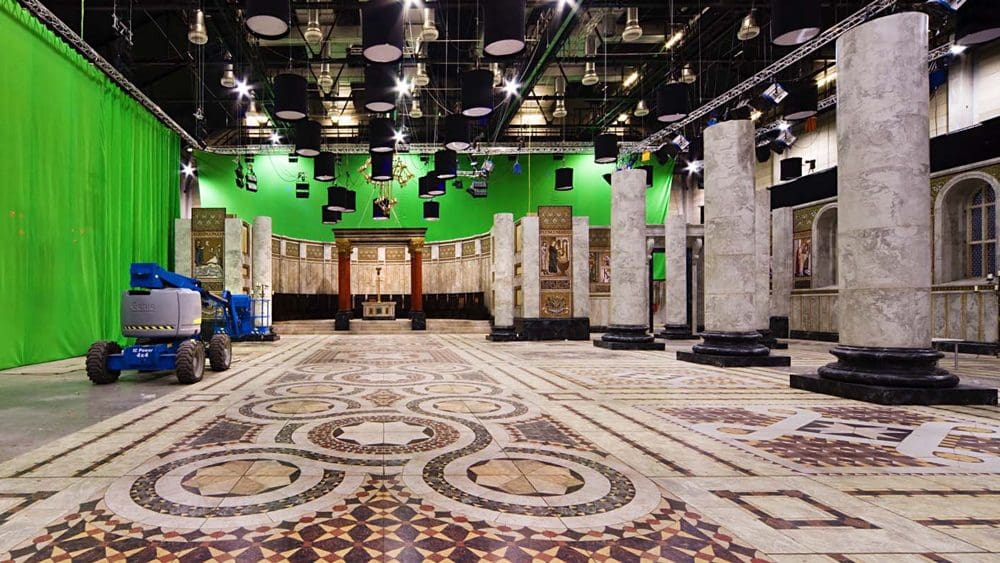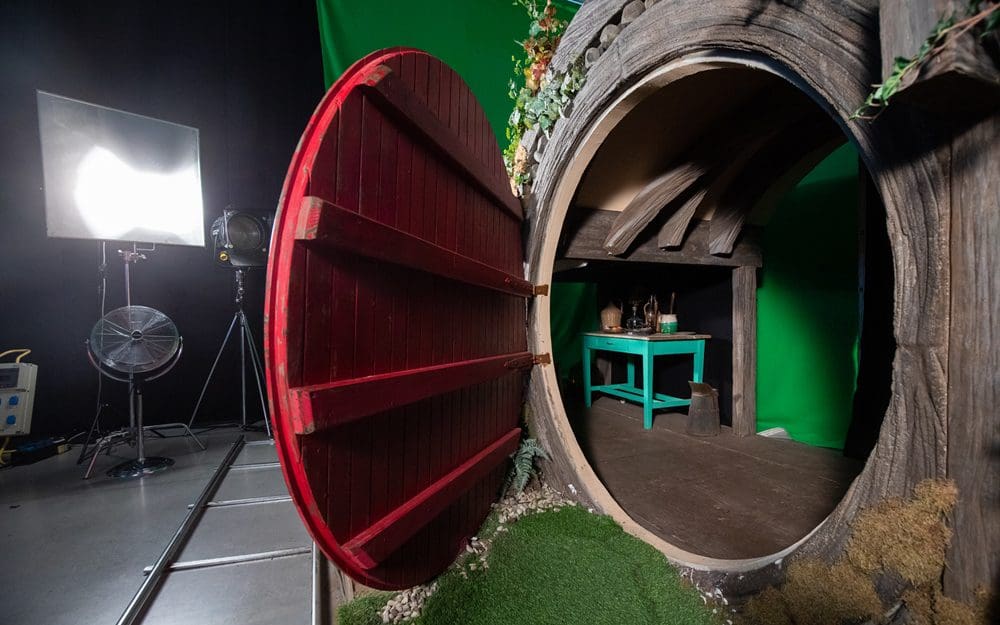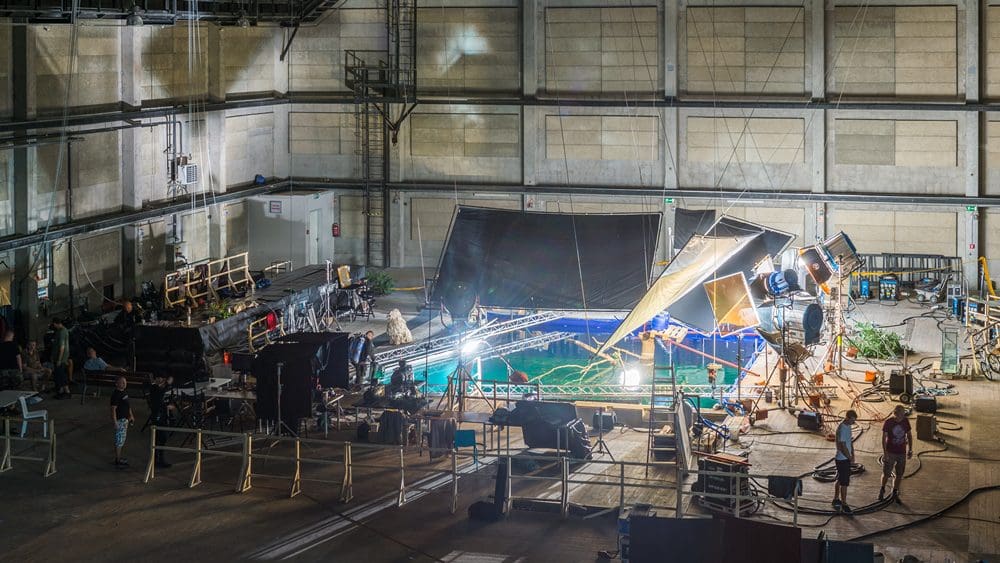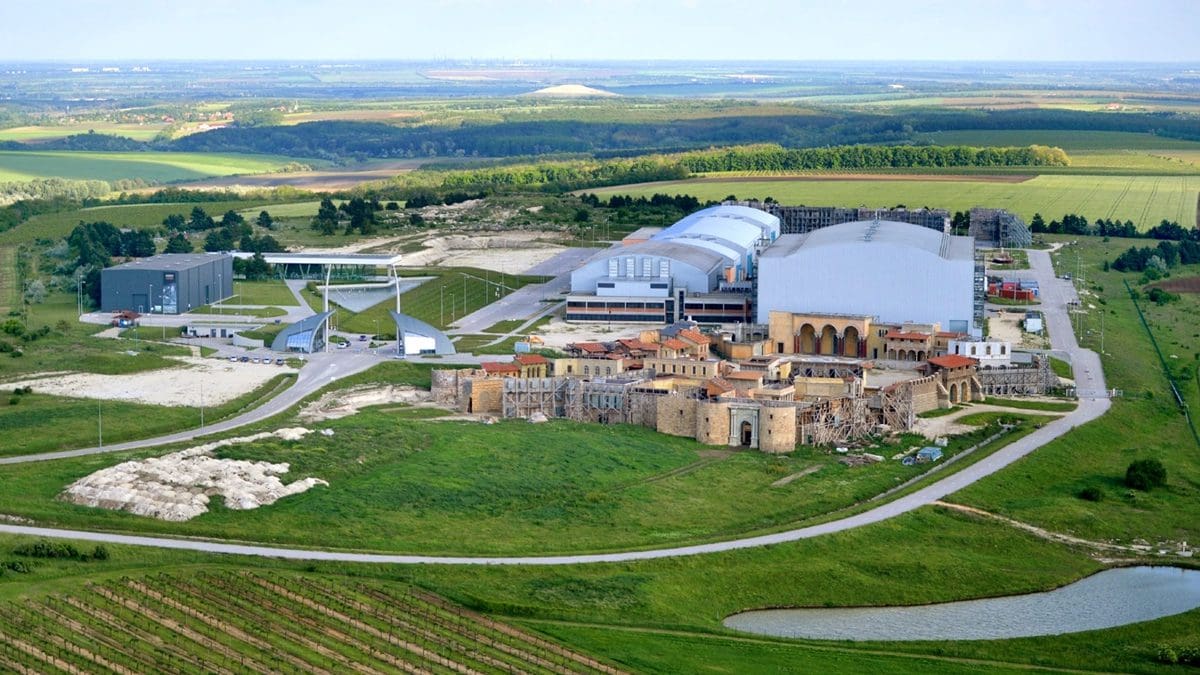There is no doubt, film production is in full swing again in Hungary. From being a simple shooting location, the country has worked its way up to the elite club of countries accommodating world-class projects. In fact, as many as three hundred productions a year are hosted in Hungary.
The movie industry has evolved into a priority sector of the Hungarian economy. Its revenues last year—despite the pandemic—exceeded HUF 200 billion, and it ensured jobs for twenty thousand people. Hungary has become one of the most popular filming locations in Europe, thanks to our qualified professionals, state-of-the-art studios, and tax benefits granted by the government.
We visited one of the flagship facilities of film production in Hungary, Korda Studios and Filmpark, or ‘Etyekwood’ (as it has been nicknamed), where we were shown around by Attila Csizmadia, communication director of the Korda Film Park.
Korda Studios, implemented from a budget of EUR 90 million, was handed over in Etyek in April 2007. With its seven soundstages, the facility has been offering its services to domestic and international film productions for fourteen years. Its founders included developer Sándor Demján, Hollywood producer Andy Vajna, Peter Munk, and Nathaniel Rothschild.
The soundstages were completed to feature state-of-the-art technology, with support facilities right next to them, including dressing rooms, makeup rooms, and offices. The soundstage which was executed last is currently the largest in Europe, with floor-space of six thousand square metres.

In addition, the complex offers one of the most advanced sound post-production studios in the region, a forty-seat projection room, an installed watertank where water scenes can be filmed, a backlot of New York streets, and a complete renaissance city as a backlot set.
‘After the year 2000, there was a shortage of world-class studios, and so Sándor Demján was approached with the proposition that there was a major market potential in such a project. Some time was needed, of course, to bring the studio complex up to the current service level, and trust in Hungary and Hungarian professionals had to be built up,’ explains Mr Csizmadia.
The name of the facility is a tribute to Hungarian-born film director and producer Sir Alexander Korda, one of the most prominent figures of the international, and, primarily, British film industry, the founder of London Films, a British film studio. Few people in Hungary grasp the significance of Korda’s lifework. He travelled around the world, and built film studios in many countries, including Hungary.
‘He spent most of his time in England; it was him who reinvigorated British film, an industry that was hitting rock bottom compared with Hollywood at the time. He is associated with the new heyday of British cinema, and the Alexander Korda Award is considered one of the most prestigious awards today. The founders of the Etyek film studio complex reckoned it would be a worthy tribute to the achievement of this great figure to name the facility after him,’ says the communication director.
Management made tremendous efforts in the market to attract as many productions as possible, and with time the first major projects started to materialize, to be used as reference soon afterwards. Hellboy II: The Golden Army was the first large-scale international production completed in the Etyek studio complex, catapulting it to a whole new level, the international arena.
Then came The Borgias, appreciated by many viewers, with Jeremy Irons as leading actor. The renaissance city installed for this production has been up ever since, with minor or more extensive adjustments if required, welcoming visitors, and serving as a location for numerous film shoots. In the second season of Marco Polo, for instance, the renaissance city of the Korda Studios stood for Constantinople. In the extensive Italian medieval backlot set initially implemented for The Borgias, the ground received a green cover in the area in front of St Peter’s Basilica, and bows of ships were installed to evoke the atmosphere of seaports of the period. Set designers applied new colours to the buildings, and remodelled porticos with curves typical of Constantinople.
‘The renaissance city became a permanent backlot set in Etyek. The Borgias were followed by the Marco Polo series, but the Hunyadi movie is also being made in the same set. We also have a permanent New York backlot street set, with a production ongoing in it right now. Earlier, Will Smith used it for Gemini Man. The New York scenes in it were filmed right here in Etyek.’
But Etyek was also used as a location for Inferno with Tom Hanks, Black Widow with Scarlett Johansson, the television series presenting Pablo Picasso’s life with Antonio Banderas, and Blade Runner 2049 with Ryan Gosling and Harrison Ford. The best-known bar scene of the latter was also filmed here in a purpose-built set. The Last Kingdom series was also shot in the vicinity, in Göböljárás, where a medieval village was built up, also owned by the same group of companies.

Of what is ‘Etyekwood’ the proudest? Attila Csizmadia says the biggest milestone has been Ridley Scott’s The Martian.
‘Matt Damon and crew were shooting in several different countries, but they had almost all their sets built here in Etyek. The desert, the life-size spaceship, and the Martian base were all implemented here in our studios. This production required such an extent of professionalism that it is now regarded as a major milestone in the history of filmmaking in Hungary. Plenty of Hungarian professionals were part of the crew. This was the project that we are the proudest of, and it had a real impact on requests we have been receiving subsequently.’
For producers, reliability is the most important factor, obviously. At least twenty thousand Hungarian professionals work on the productions here, from construction staff to makeup artists and costume designers. Hungary boasts a really strong pool of professionals, and producers are fully aware of it.
‘Then, the last seven or eight years were really intense. Thanks to our professional organization efforts and the services we provide, the capacities of Korda Studios are booked years ahead, which is quite promising. Bug international production companies have been returning to us. We are also having productions of our own, where the whole process is coordinated here. The other attractive factor in Hungary is the incentives filmmakers have been granted by the state. There should be no doubt about it: it is cheaper to make films in Hungary than elsewhere,’ says Mr Csizmadia.
Film stars have been coming to Hungary regularly for some time now, which is good for the country’s image. Based on the feedback they have provided, they have a good time here, enjoying themselves in Hungary.
Harrison Ford, for example, wandered around the city, taking lunch in different restaurants. He also said he bought his favourite croissant in Aldi that he popped into while staying at the Four Seasons hotel. Ryan Gosling’s picture was taken in the Kőleves restaurant, Will Smith was photographed on Chain Bridge, and lots of pictures were taken of Tom Hanks with the retro ‘Kispolszki’ (Polski Fiat 126) car, his favourite.
‘Jeremy Irons put on his leather jacket, hopped on his motorbike, and went to town to party. A few days later he was seen in Esztergom, having coffee. But Antonio Banderas also surprised people in the streets of Budapest when he visited the Christmas fair. The boost of film productions in Hungary is also having a significant marketing benefit. The stars visit the country, have fun here, and say all the good things, which enhances the reputation of the country.’
In the thirty-five-hectare area of Korda Studios, the Korda Filmpark Experience and Event Centre was launched in 2011. ‘The goal of Korda Filmpark is to bring people closer to filmmaking, to let them take a look behind the scenes, and to understand how an international movie project is managed. The exhibition and tour offered here have a degree of interactivity: visitors can get a taste of what it feels like to be members of a crew, and have to tackle real problems of filmmaking. Our goal is to make people understand why the end-credits roll for so long at the end of a movie, to make them realise how many people’s organised and precise work is necessary for producing the end result they will be seeing on the canvas,’ explains the communication director, adding that apart from being playful and interesting, the experience tour is also meant to educate.

‘We offer a number of programmes which are in connection with filmmaking. We arrange, for instance, so-called “film building” events where the group will make a short film together with costumes, makeup, editing, and so on. Such occasions are always great fun for the participants, who also receive their product as a gift in the end.’
The international embeddedness of Hungarian film has sharply increased recently, as following a weaker period after the regime change, the domestic film industry gained new momentum with Andy Vajna.
‘It is palpable by all means that the international penetration of Hungarian motion pictures has increased in recent years. With Andy Vajna’s arrival, a new period started: he brought together Hungarian filmmakers in a professional manner, strengthening the industry, which has been confirmed by its results in the international arena. A period of boom started—we shall see how long its momentum lasts. Vajna’s departure will certainly be felt by the industry. We are humans with an impact on our environment, and the loss of such a high-impact individual makes itself felt. Some personalities leave a stronger, deeper mark—Andy Vajna and Alexander Korda were people like that,’ says Csizmadia.
It is also important to mention that content consumption pattern have completely changed in the last few years. In addition to consumption becoming faster, many new platforms have been created, which strongly determines how people watch movies, how much time they devote to this activity, and how deeply they immerse themselves in it.
‘People are less patient, and in the current information noise they are no longer into the cinematic style that was still natural in the 1960s and 70s. The strong presence of Hollywood productions with grand visuals has overshadowed European cinema. The market of streaming providers and quality series has expanded, and great actors also joined the respective productions as lead actors, one after the other. Naturally, the zeitgeist, the spirit of the age, has also changed: problems are different, accents have shifted,’ says the communication director. ‘We should realize that there is a generation that already grew up on international large-scale quality series, and its members will not turn back—there is a huge market for such productions. Those countries where this transition was not happening organically need to start writing scripts of television series, which are not the same as a feature film split into several parts. Our script writers were not socialized in this vein, so they have to learn how to write series now. Hungary only has a small number of series of its own production; most of what we can see on television are license-based. There is no problem with production itself here, it’s the creative processes which need to change. This is still ahead of us.’
Click here to read the original article published on Mandiner.hu







